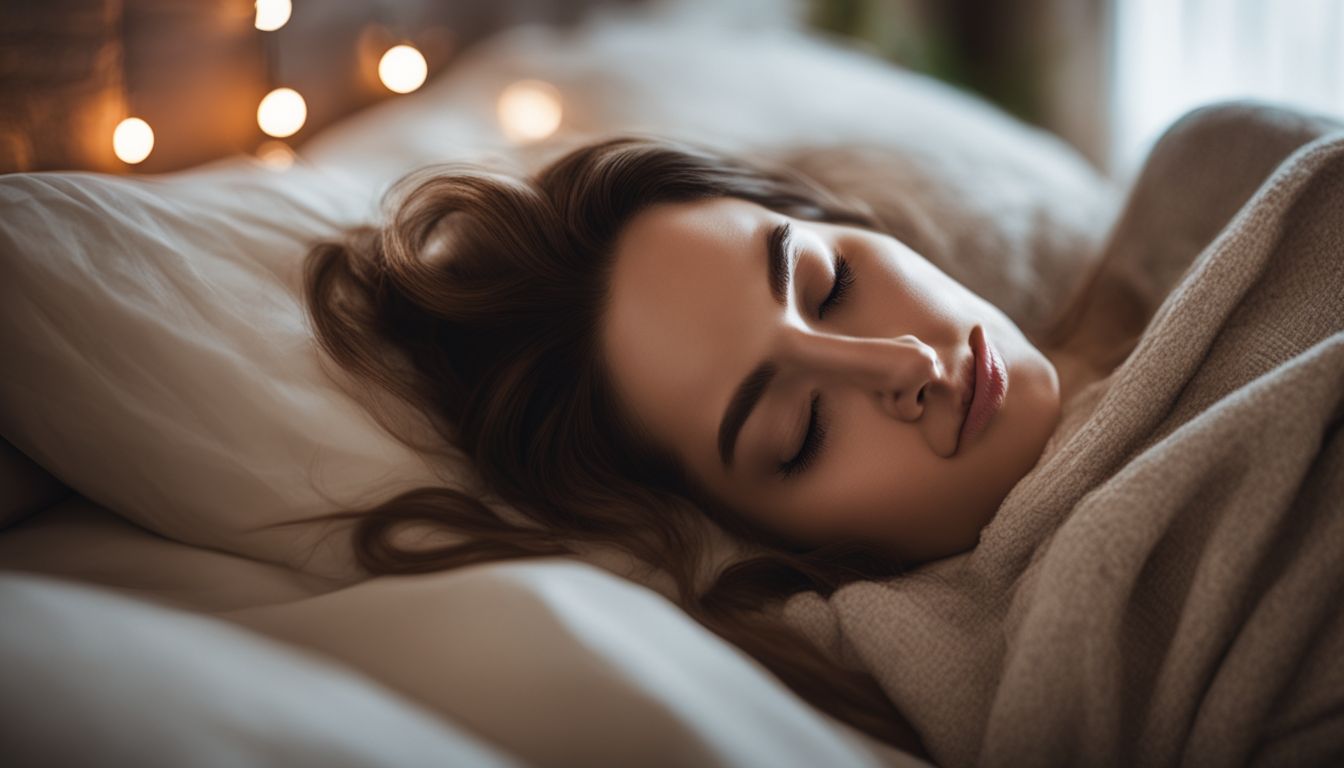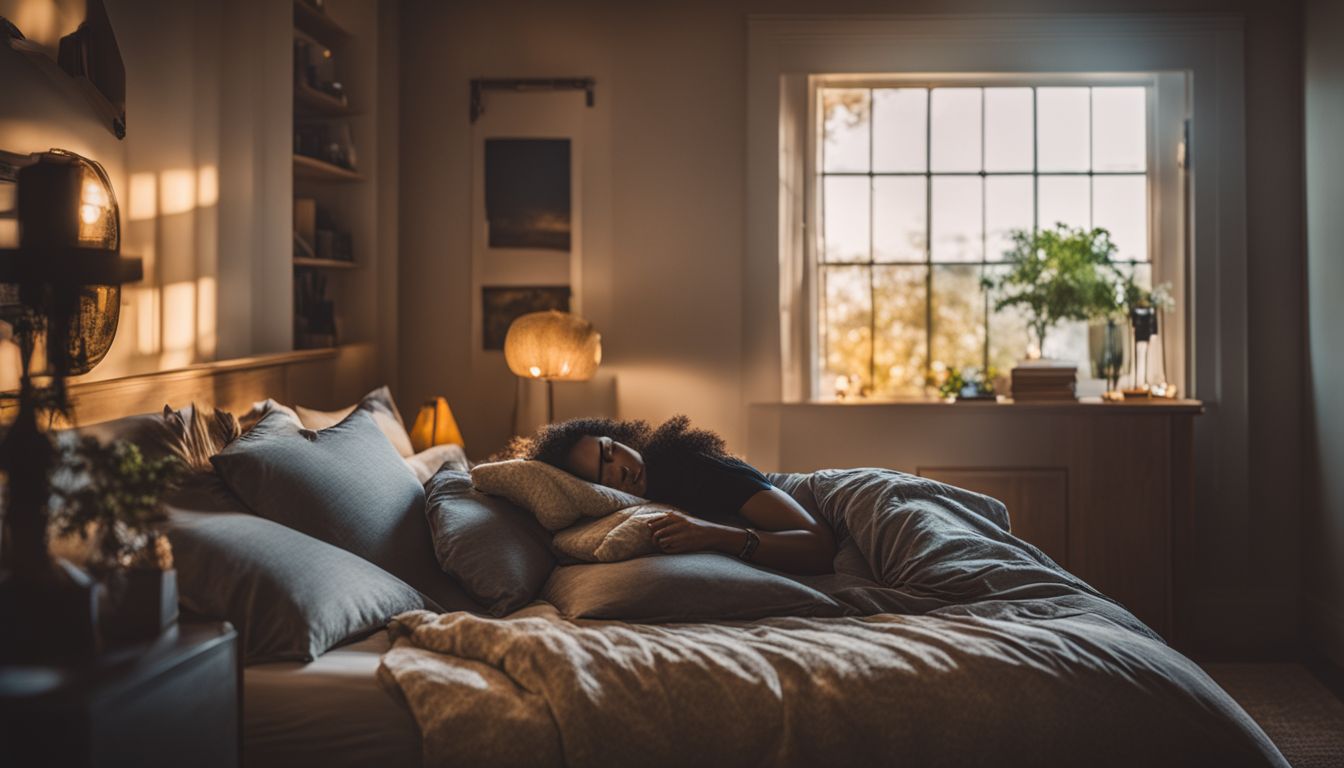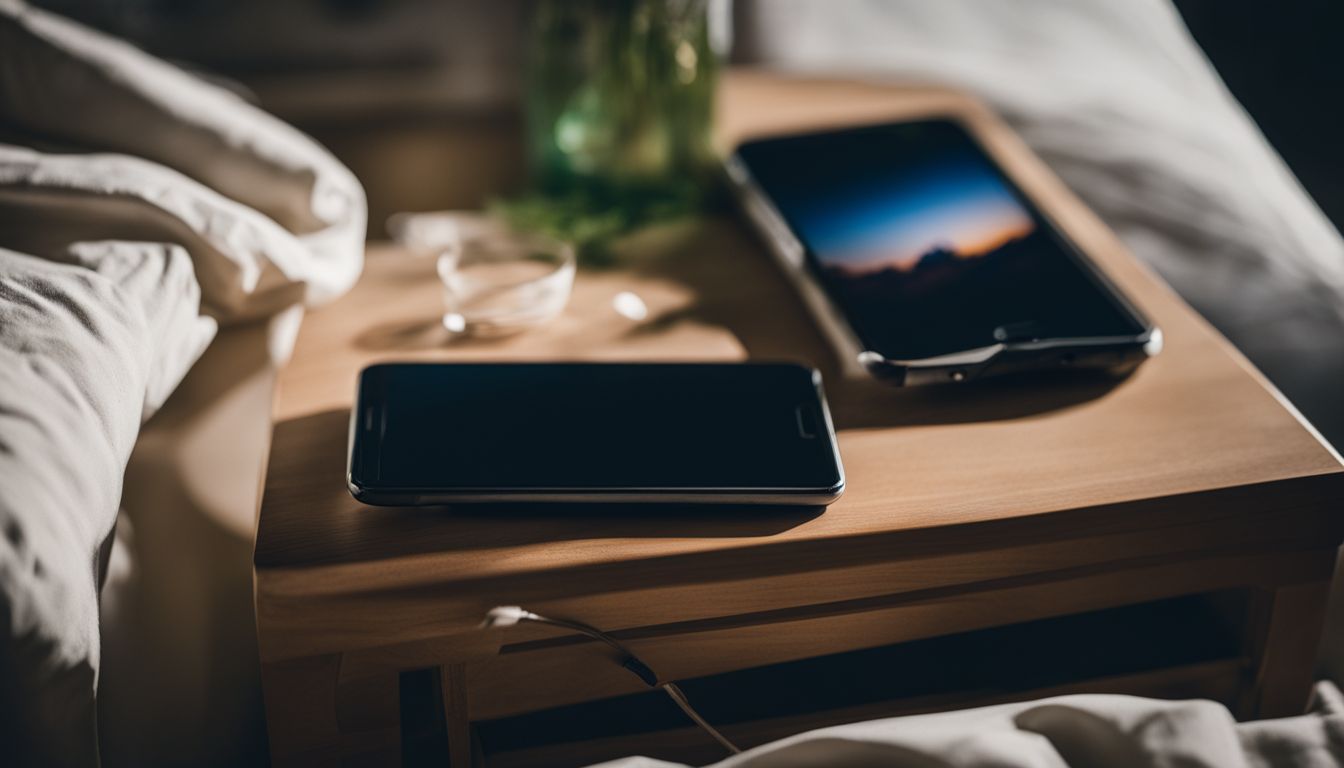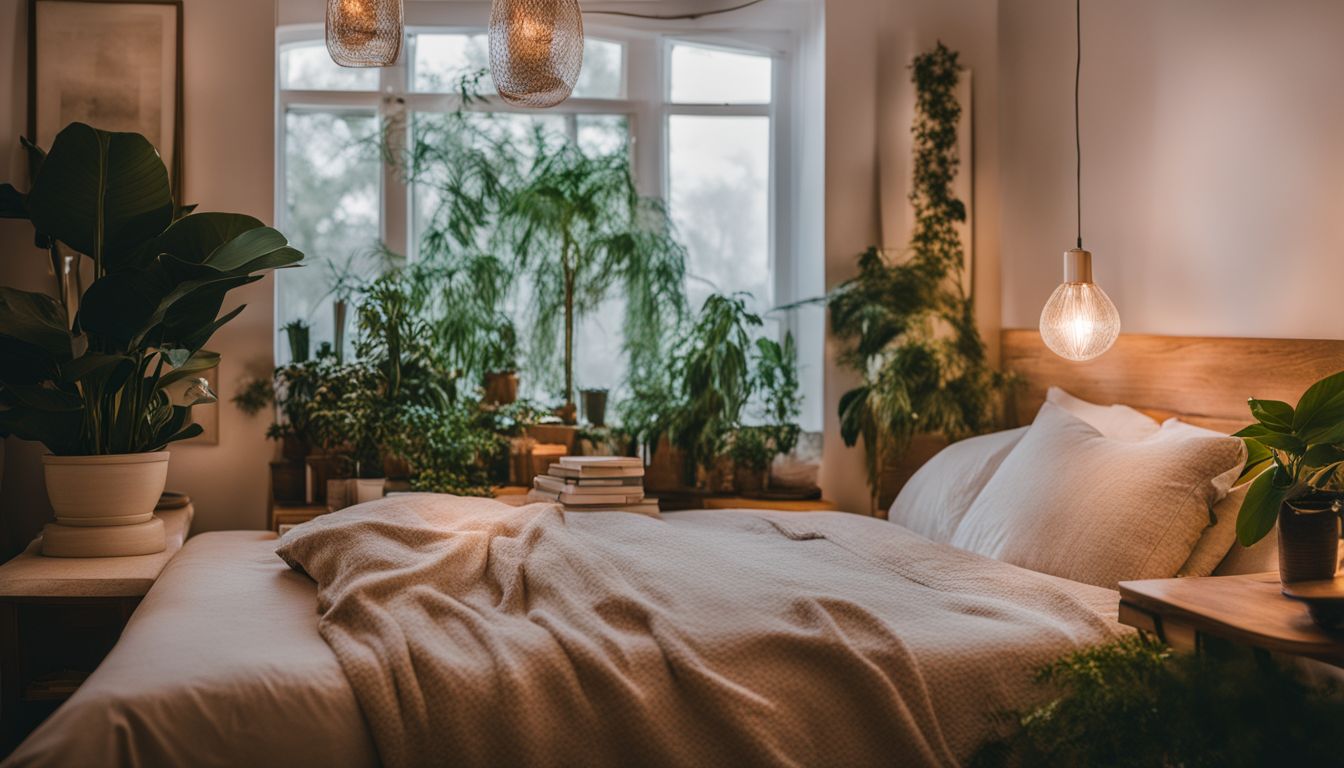Discover the Surprising Daily Habits That Are Sabotaging Your Sleep!
Do you often wake up after a full night’s sleep, only to feel like you haven’t slept at all? This unforgiving cycle of poor rest could be due to certain overlooked daily habits. Our blog post today will break down the causes, symptoms and treatment options for sleep deprivation, focusing on how day-to-day routines can impact your sleep health.
Let’s dive in and discover how these everyday habits can set the stage for a good or bad night’s slumber!
What is Sleep Deprivation?

Sleep deprivation is a condition characterized by the lack of adequate sleep, resulting in various symptoms and negative effects on overall health and well-being.
Overview

Sleep deprivation is not just about feeling tired. It’s a serious issue that can shake up your life and health. When you lack sleep, your brain and body suffer too. This condition affects mood, memory, and overall well-being.
Some signs of poor sleep are mood swings and trouble with remembering things. Many things lead to bad sleep like restless leg syndrome or mental health issues. Putting an end to this problem starts with finding out what causes it and making sure you have good bedtime habits called sleep hygiene.
Symptoms and Causes

Sleep deprivation occurs when a person doesn’t get enough sleep or experiences poor quality sleep. The symptoms can vary, but common signs include mood disturbances, memory problems, and an increase in accidents or mistakes.
There are several causes of sleep deprivation, including underlying medical conditions like sleep apnea and insomnia, as well as lifestyle factors such as excessive screen time before bed and high levels of stress.
Lack of sleep can have negative effects on both physical and mental health, contributing to conditions like obesity, diabetes, and depression. It’s important to identify the underlying causes of sleep disorders and make changes to improve sleep hygiene in order to promote better quality sleep and overall well-being.
Diagnosis and Tests

Doctors may diagnose sleep deprivation by asking about your symptoms and reviewing your sleep patterns. They may also recommend tests such as a sleep study to measure brain activity, heart rate, and breathing during sleep.
It’s important to address any underlying causes of sleep deprivation to improve your overall health and well-being.
Management and Treatment of Sleep Deprivation

Treating sleep deprivation involves addressing the underlying causes, such as lifestyle choices, stress management, and establishing a consistent sleep schedule. Additionally, therapies like cognitive behavioral therapy for insomnia (CBT-I) and medication may be recommended to promote restful sleep.
It is essential to consult with a healthcare professional for an accurate diagnosis and personalized treatment plan.
How is it treated, and is there a cure?

To treat sleep deprivation, it is important to identify and address the underlying causes. In some cases, lifestyle changes alone can improve sleep quality. This includes maintaining a consistent sleep schedule, creating a relaxing bedtime routine, and ensuring a comfortable sleep environment.
Avoiding stimulating activities before bed and limiting caffeine intake can also help. For individuals with more severe sleep disorders like insomnia or sleep apnea, medical treatments may be necessary.
These treatments may involve medication or the use of devices such as continuous positive airway pressure (CPAP) machines for sleep apnea. While there isn’t necessarily a cure for sleep deprivation itself, managing the underlying causes and adopting healthy sleep habits can greatly improve overall well-being and restore restful sleep.
How to take care of myself or manage the symptoms?

To take care of yourself and manage sleep deprivation symptoms, follow these tips:
- Establish a consistent sleep schedule: Go to bed and wake up at the same time every day, even on weekends.
- Create a bedtime routine: Wind down before sleep by engaging in relaxing activities like reading or taking a warm bath.
- Make your bedroom conducive to sleep: Keep the room dark, quiet, and at a comfortable temperature.
- Avoid stimulating substances: Limit caffeine intake, especially in the afternoon and evening, and avoid nicotine and alcohol close to bedtime.
- Limit daytime napping: If you must nap, keep it short (around 20 minutes) and avoid napping late in the day.
- Manage stress: Practice stress-reducing techniques such as deep breathing exercises or meditation before bed.
- Get regular exercise: Engage in moderate-intensity physical activity during the day, but avoid exercising too close to bedtime.
- Create a relaxing sleep environment: Use comfortable bedding and pillows that support good sleep posture.
- Avoid electronic devices before bed: The blue light emitted from screens can interfere with your body’s melatonin production, making it harder to fall asleep.
- Seek professional help if needed: If your symptoms persist or worsen, consult a healthcare provider who specializes in sleep disorders.
- Sleep deprivation is when a person isn’t getting enough sleep or is experiencing poor quality sleep.
- Severe sleep deprivation can have a negative effect on mood, memory, and overall health.
- Poor sleep hygiene can contribute to sleep deprivation.
- Lack of sleep is associated with obesity, diabetes, heart disease,and Alzheimer’s disease.
- Identifying underlying causes of sleep disorders and improving sleep hygiene can help improve sleep quality and overall health.
Prevention of Sleep Deprivation

To reduce the risk of developing sleep deprivation, it is important to incorporate healthy habits such as maintaining a consistent sleep schedule and creating a comfortable sleep environment.
Ways to reduce the risk of developing sleep deprivation
To reduce the risk of developing sleep deprivation, follow these habits:
- Stick to a consistent sleep schedule: Go to bed and wake up at the same time every day, even on weekends.
- Create a relaxing bedtime routine: Engage in calming activities like reading or taking a warm bath before going to bed.
- Make your bedroom conducive to sleep: Keep your bedroom quiet, dark, and at a comfortable temperature.
- Limit exposure to electronic devices before bed: Avoid using smartphones, tablets, or computers for at least an hour before bedtime.
- Avoid consuming stimulants close to bedtime: Limit or avoid caffeine and nicotine as they can disrupt your sleep.
- Exercise regularly but not close to bedtime: Engaging in physical activity during the day can promote better sleep.
- Manage stress effectively: Practice relaxation techniques like deep breathing exercises or meditation before bedtime.
- Create a comfortable sleep environment: Invest in a good mattress and pillows that support your body’s needs.
- Avoid heavy meals and excessive fluid intake before bed: Eating large meals or drinking too much liquid close to bedtime can cause discomfort and frequent trips to the bathroom.
- Seek medical attention if experiencing persistent sleep problems: If you’re consistently having trouble sleeping, consult a healthcare professional for further evaluation.
Daily Habits that Could Impact Your Sleep

Daily habits such as clothing choice, diet, technology use, stress levels, and exercise can significantly impact the quality of your sleep.
Clothing

The clothing you wear can impact the quality of your sleep. It’s important to choose comfortable and breathable fabrics, such as cotton or bamboo, that allow for good airflow and don’t trap heat.
Tight or restrictive clothing can make it difficult to get comfortable in bed and may cause discomfort throughout the night. Additionally, wearing layers to bed allows you to adjust your body temperature easily if you become too hot or too cold during the night.
Opting for loose-fitting pajamas or sleeping in lightweight, breathable garments can help promote a more restful sleep.
It’s also worth noting that what you wear during the day can affect your sleep at night. Wearing tight-fitting clothes or shoes with uncomfortable materials throughout the day can lead to physical discomfort and muscle tension when trying to relax in bed.
Diet

A healthy diet plays a crucial role in getting a good night’s sleep. Certain foods can help promote better sleep, while others can disrupt it. Avoid consuming heavy meals close to bedtime as digestion can interfere with sleep.
Instead, opt for lighter and easily digestible snacks if you feel hungry before bed. It’s also important to limit your intake of caffeine, alcohol, and sugary or spicy foods as they can interfere with your ability to fall asleep and stay asleep throughout the night.
Incorporating foods rich in tryptophan, magnesium, and calcium into your diet can promote relaxation and improve sleep quality. Good food choices include bananas, almonds, warm milk (non-caffeinated), whole grains, and herbal teas like chamomile or lavender tea which have calming properties that aid in better sleep.
Technology use

Using technology before bed can negatively affect your sleep. The blue light emitted by electronic devices like smartphones, tablets, and computers can suppress the production of melatonin, a hormone that helps regulate sleep.
This makes it harder to fall asleep and stay asleep throughout the night. Additionally, engaging in stimulating activities like playing video games or watching action-packed TV shows can keep your brain alert and make it difficult to wind down for sleep.
It is recommended to limit technology use in the evening and establish a bedtime routine that includes relaxation techniques instead.
Stress
Stress can significantly impact your sleep quality. When you’re stressed, it becomes difficult to relax and fall asleep. Stress can also cause interruptions in your sleep, leading to frequent awakenings throughout the night.
Additionally, stress can contribute to the development of sleep disorders like insomnia or sleep apnea. It’s important to manage stress effectively through relaxation techniques such as deep breathing exercises, meditation, or engaging in activities that help you unwind before bed.
Creating a calm and peaceful sleep environment can also promote better sleep by reducing stress levels.
Exercise
Regular exercise can have a positive impact on sleep quality. Engaging in physical activity during the day can help tire your body, making it easier to fall asleep at night. Exercise can also reduce feelings of stress and anxiety, which are common causes of sleep disturbances.
Additionally, exercise has been shown to improve muscle strength and increase antioxidant activity in the body, which can contribute to overall health and well-being. However, it’s important to note that exercising too close to bedtime may actually make it harder for you to fall asleep.
It’s best to finish your workout at least a few hours before bed to allow your body time to wind down and relax before sleep. So remember, regular exercise is beneficial for both your physical and mental health, but be mindful of the timing so as not to disrupt your sleep routine.
Sleep environment
Creating a conducive sleep environment is essential for getting good quality sleep. Your bedroom should be quiet, dark, and at a comfortable temperature. Remove any distractions that may disturb your sleep, such as electronic devices or bright lights.
Make sure your mattress and pillows are comfortable and supportive. It’s also important to establish a regular sleep schedule and stick to it as much as possible. By creating a peaceful sleep environment, you can improve the quality of your sleep and wake up feeling more refreshed in the morning.
Conclusion

In conclusion, paying attention to your daily habits can greatly impact the quality of your sleep. By taking simple steps like wearing comfortable clothing, eating a healthy diet, reducing technology use before bed, managing stress levels, incorporating exercise into your routine, and creating a conducive sleep environment, you can improve your sleep and overall well-being.
Don’t ignore these habits – prioritize them for a restful night’s sleep.
FAQs
1. What are some daily habits that can negatively affect my sleep?
Some daily habits that can negatively affect your sleep include consuming caffeine or alcohol close to bedtime, using electronic devices before bed, having an irregular sleep schedule, and eating heavy meals late at night.
2. How many hours of sleep do I need each night?
On average, adults need around 7-9 hours of quality sleep per night for optimal functioning and overall well-being.
3. Can lack of exercise affect my sleep?
Yes, lack of exercise can impact your sleep quality. Regular physical activity helps promote better sleep by reducing stress levels and increasing the time spent in deep restorative stages of sleep.
4. What can I do to improve my sleep hygiene?
To improve your sleep hygiene, establish a consistent bedtime routine, create a peaceful sleeping environment with dim lighting and comfortable bedding,
avoid stimulating activities before bed, and limit daytime napping to ensure better nighttime restfulness.







